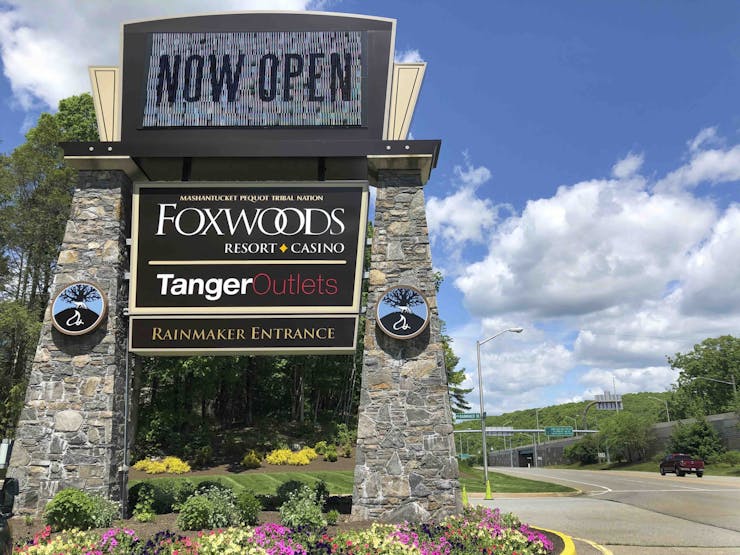One of the nation’s largest tribal-owned marijuana stores is coming to—or at least near—Connecticut’s famous Foxwoods Resort Casino, and another is being planned near Harrah’s Cherokee Casino Resort in North Carolina.
Connecticut legalized adult-use cannabis earlier this year. On July 1, 2021, it became legal for all adults 21 and older to possess up to 1.5 ounces of marijuana. Retail sales in state-licensed stores are expected to begin in the summer of 2022.
In North Carolina, all cannabis is strictly prohibited. The state hasn’t even legalized medical marijuana yet. But the North Carolina Compassionate Care Act, a bill to legalize medical cannabis, is currently making progress in the state legislature.
Native American tribes are not bound by state law, and do not require a state cannabis license. In other legal states, tribes typically tax cannabis at a rate comparable to the state, but the tax revenue goes to the tribe, not the state. Earlier this month, the Eastern Band of Cherokee Indians Tribal Council voted to legalize medical marijuana on Cherokee land.
The Foxwoods-adjacent store may not cause much concern among state or federal officials, because Connecticut is now adult-legal. But opening a tribal dispensary in a non-medical state like North Carolina would be a precedent-setting action—and it’s unclear whether the Cherokee tribe will wait until the state legalizes medical before opening its dispensary.
Cherokees, Mashantucket Pequots heading the initiatives
A source close to both initiatives, who asked to remain anonymous due to the sensitivity of the political situation in North Carolina, told Leafly both projects are being planned at mega-dispensary scale, with footprints exceeding 25,000 square feet.
The stores will each offer two drive-thru windows and a smoking lounge, and locate near the tribes’ popular casino resorts.
Jeremy Wilson, the Cherokee tribe’s governmental affairs liaison, said the Cherokees are still deciding between a handful of sites for the new mega-dispensary, which will likely be named Kituwah Medical. Wilson said the tribe is working toward an opening date in the summer of 2022.
The tribe’s first option is to convert a massive standalone bingo hall one a mile north of Harrah’s Cherokee Casino Resort, which is about 50 miles west of Asheville, NC. The bingo hall has been closed since the COVID-19 pandemic swept through the United States in March 2020.

Located near Great Smoky Mountains National Park
The 1,100-room Harrah’s Cherokee resort in western North Carolina is located just a few miles from the Great Smoky Mountains National Park, one of America’s most popular national parks.
If the former bingo hall doesn’t work out, another potential choice is the former site of Cherokee High School, located just two miles away from the casino resort. The facility shuttered in 2009 and the tribe demolished the old building in 2017.
Thousands of shoppers daily
Wilson said regardless of where the Cherokees build their dispensary, it will be equipped to serve “several thousands” of daily shoppers.
“This is going to be the only legal cannabis dispensary within hundreds of miles around,” he said. “So we’re preparing to accommodate large volumes of people. We can’t do that with a mom-and-pop location.”
Wilson said the tribe plans to begin publicizing its new dispensary during the coming months, once they decide on a location and can begin developing it.
Meanwhile, near Foxwoods…
In Connecticut, the tribal owners of one of the East Coast’s most popular casinos also plan to open a mega-dispensary in 2022. The Mashantucket Pequot tribal nation operates Foxwoods Resort Casino on the tribe’s 1,250-acre reservation in the southeast corner of the state.
The dispensary, which could open as early as the spring, will be located less than a half-mile from the casino resort—adding to the Mashantucket Pequots’ portfolio of nearby tourist attractions that include a golf course, movie theater, retail shopping mall, trio of spas and dozens of restaurants.
Two separately interviewed officials from the tribe’s eight-member legislative government confirmed the cannabis project, but they spoke on condition of anonymity because Mashantucket Pequot leadership had not authorized them to speak publicly.
Tribes diversifying from gaming
If there’s anything the COVID-19 pandemic has taught tourism-based economies like those of many U.S. tribal nations, it’s that offering visitors a variety of options is now necessary for survival. When last year’s lockdowns suffocated the hotel and gaming industries, the Eastern Cherokees and Mashantucket Pequots saw their main sources of revenue evaporate—to the tune of tens of millions of dollars.
Not long before COVID, back in May 2018, the U.S. Supreme Court also ruled to start allowing states to legalize sports betting. Lowering barriers to entry for non-tribal operators was yet another hurdle for Native American groups in an industry that many U.S. tribes had relied on for decades as a proven income stream.
In the meantime, legal marijuana sales have continued to soar. The U.S. industry eclipsed $18.5 billion in sales last year. Total legal revenue is on pace to top $25 billion in 2021, according to a recent Leafly/Whitney Economics analysis.





